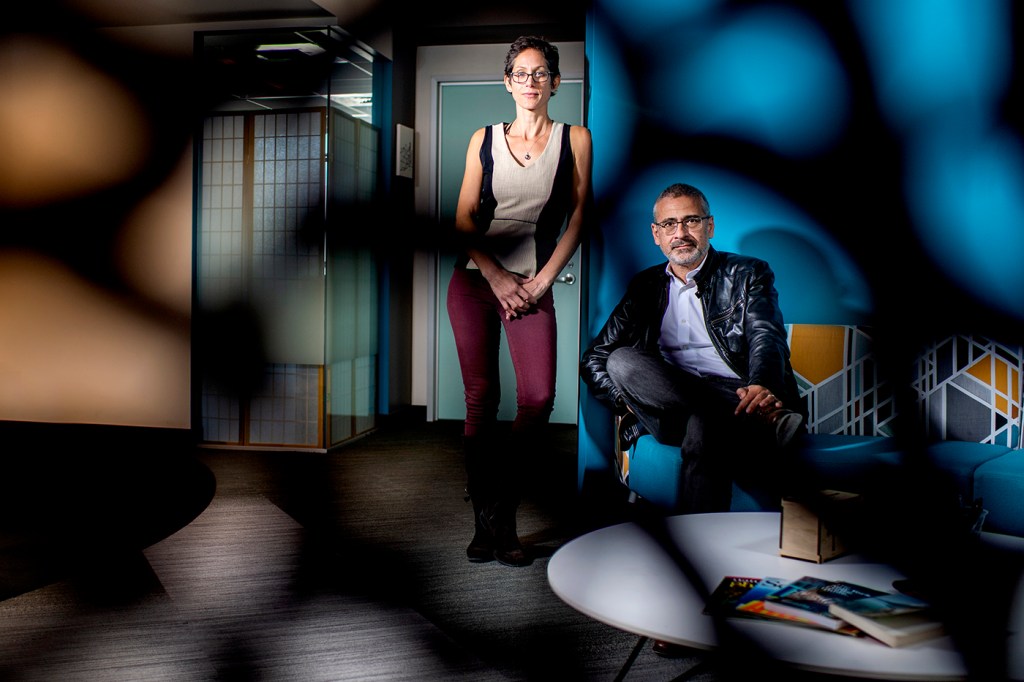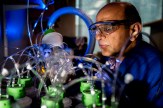Northeastern Network Science Institute at launches NSF-funded project with Indiana University to build international network science collaborations

Tweets that affect financial markets. The tiny electrical signals racing in your brain. That dreadful commute to work. A record-setting Ebola outbreak. Fake news.
Everything moves through a network. And every network is a part of, essentially, one big network of networks, says Alessandro Vespignani, Sternberg Family Distinguished University Professor of Physics, Computer Sciences, and Health Sciences at Northeastern.
Vespignani, who studies how complex networks and systems work, says the field of network science is moving away from the traditional approach in which processes are modeled with a single network in mind to try and predict how things move—be they matter, information, or energy. That’s simply because networks don’t exist in a vacuum. Instead, he says, they are embedded within larger systems of interconnected networks that have ripple effects amongst each other.
Analyzing these multilayer, or multiplex, networks is basically network science on steroids, Vespignani says. Think of how fake news travels on social media, where looking at just one network alone won’t get to the problem of how and why people spread misinformation.
“We need to look at the Facebook network coupled with the news network, with Twitter, and even the actual physical encounters in meetings, in workplaces,” says Vespignani, who directs the Network Science Institute at Northeastern.
As the world becomes increasingly connected, studying these networks of networks could provide a unique approach to tackling complex global issues. The network science institutes of Northeastern and Indiana University are leading a project to build international collaborations to explore multilayer networks and build a global community of network scientists.
Funded by a $2 million grant from the National Science Foundation, the new initiative, called AccelNet-MultiNet, involves working together with researchers in European universities who specialize in different aspects of multilayer networks. It will provide scientists all over the world with the tools and data to make better models and predictions of processes such as sharing ideas, mapping the brain, reducing traffic jams, or fighting epidemics.
“That is more and more important as we think about issues such as sustainability, climate change, and public health,” says Kate Coronges, executive director of Northeastern’s Network Science Institute. “It’s one thing to look at these massive problems from a U.S. point of view, but another to think of them in terms of their broader human and societal questions.”
For network scientists, these global issues are rooted in the basics of networks and complex systems, Vespignani says. These networks can be described using equations that can, in turn, be extrapolated to analyze many types of issues working in concert, he says. The power of network science is that: conceptual simplicity. What you fold into the mathematics of these networks may be very different things—cars, computers, people, cells—but the basic equations that you can use to describe these processes are essentially universal.
However, because of its interdisciplinary nature, network science research is often fragmented, focusing on specific domains or very narrow technical methods. That is, in part, because the robust mechanisms that would enable scientists to generate and exchange that kind information don’t exist yet, Coronges says. The new project is intended to change that by creating international consensus around the future challenges and priorities.
Vespignani, who does not stop thinking in terms of networks, says the project will give network science a taste of its own medicine, creating a network to solve a problem of networks. It will essentially create a community of people with various types of expertise in network science from across the globe.
Like a dream team of network scientists.
“But if you put the best players in the world in a team, and they have never practiced together, they will rarely win anything,” Vespignani says. “This is creating the practice field for all those people so they can really be world champions.”
For media inquiries, please contact Shannon Nargi at s.nargi@northeastern.edu or 617-373-5718.





